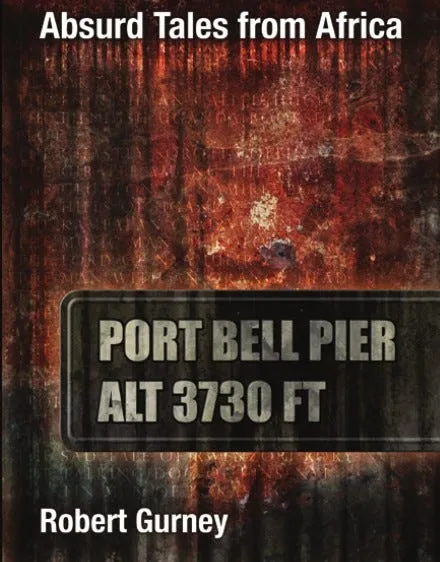Story 4 from ‘Absurd Tales from Africa’ by Robert Gurney
Owen set out in his Land Rover from a friend’s house in Nakuru. He was on his way to the Ecotopia Hotel in Amboseli to discuss his research interests with a colleague from Nairobi. He had nearly completed his journey when his vehicle broke down. He looked out through his side window and saw some elephants ambling by in a cloud of dust.
He loved Amboseli. He knew it well. It was where he did most of his data-gathering. He knew that Amboseli was drying out but, in a curious way, he didn’t mind. It was, after all, becoming his bread and butter. He reached for his water bottle. Empty.
“Well,” he said to himself, “there is nothing else for it. I shall have to walk.” Off he set.
At first he felt he was making good progress. He had a compass and was confident that he was going in the right direction.
Owen Evans’s background was Geography. He was proud to have landed a plumb job at Makerere. He had been bored with his work at Swansea University. His work on waterspouts, which could be spotted now and then in the Bristol Channel, had been going nowhere, despite it having taken him to study steam devils — tornadoes over water — on Lake Michigan.
His field of research in Uganda was dust devils. He believed that Uganda would be reduced to a dusty desert within half a century unless people stopped cutting down trees. His PhD topic involved a study of the causes of dust devils, the myths surrounding them, and the names that people around the world gave them. He had just finished doing research among the Kikuyu where, he had found, a dust devil is called ngoma cia aka, which translates as “women’s devil” or “women’s demon”. His research was taking him in the direction of Anthropology and he was pleased about that. He was finding the latter much more interesting than straight, dry Geography.
The discovery of dust devils on Mars had fired his imagination. He felt that he could possibly be moving into an up-and-coming area. He had recently read a paper on the role dust devils had played in around one hundred aircraft accidents. Could they threaten spacecraft, he wondered? He was focusing more and more on the structure and nature of vortices.
As he wandered along across Amboseli National Park, he could not but admire the beautiful shapes of the dust devils that were accompanying him. He felt happy. This was why he was here. His mind went back to a trip he had made to Australia where he had studied Aboriginal myths of the ‘willy-willies’ or ‘whirly-whirlies’, as the phenomena are called there. He remembered the story of the spirit that emerged from a dust devil and abducted a child. Children were told this to make them behave.
In many Arabic-speaking countries he had discovered that they were coterminous with djins or genies. Noting that some of those he could see were whirling clockwise, he recalled his great experiences among the Navajo in America. There they are seen as the spirits of the dead. Clockwise spinning indicated a good spirit, anticlockwise ones were bad. In the distance he saw a “bad” one coming towards him.
Lost in these and other thoughts he did not notice how tired he was becoming and how thick the dust was in the air. He began to slow down. By midday, he was on his hands and knees. He was suffering from a terrible thirst. He was finding it hard to breathe.
A man came towards him dressed in traditional Maasai garb.
“Water, water,” he cried, pointing his finger into his mouth. “Maji, maji,” he repeated in Swahili.
“Hakuna maji,” the stranger replied. “No water. Hariri, hariri nzuri.” He produced some beautiful silk ties.
“Sitaki hariri tie. I don’t want silk ties,” he whispered through his parched lips.
The stranger shrugged his shoulders and went on his way.
Clive thought that he had had it. “I’m a ‘croaker’”, he said to himself, using his native Gower dialect to describe a dead or dying man.
Something in him told him not to give up, that help was near at hand and, lo and behold, in the distance, through the screen of dust, he made out the shape of his destination. He told himself that the first thing he would do, after drinking a gallon of water, would be to jump in its cool, blue swimming pool.
He crawled across the car park watched by a group of horrified Chinese tourists. He headed straight for the restaurant. Dinner was in progress. He was delighted to see that the guests were wearing full evening dress.
“Civilisation!” he said to himself.
“Water,” he gasped at a waiter who came towards him. “Reservation.” He was unable to form a sentence.
Whether the waiter, who was French-speaking, Tutsi perhaps, did not recognise him or whether he thought that Owen was drunk is not known, but the response he received took away any breath he had left.
“Non, non, monsieur. Pas possible!” the waiter said holding up the palms of his hands as if to stop him. “Vous n’avez pas de cravate. You cannot come in. You have no tie.”
BUY this book from Amazon or DIRECT from the publisher — and support the author Robert Gurney
Story 5 in this series is ‘The Bowling Green Man of Entebbe’.
….to be continued.


